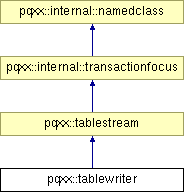|
Public Types |
| typedef unsigned | size_type |
Public Member Functions |
| | tablewriter (transaction_base &, const PGSTD::string &WName, const PGSTD::string &Null=PGSTD::string()) |
| template<typename ITER> |
| | tablewriter (transaction_base &, const PGSTD::string &WName, ITER begincolumns, ITER endcolumns, const PGSTD::string &Null=PGSTD::string()) |
| | Write only the given sequence of columns.
|
| | ~tablewriter () throw () |
| template<typename IT> |
| void | insert (IT Begin, IT End) |
| template<typename TUPLE> |
| void | insert (const TUPLE &) |
| template<typename IT> |
| void | push_back (IT Begin, IT End) |
| template<typename TUPLE> |
| void | push_back (const TUPLE &) |
| void | reserve (size_type) |
| template<typename TUPLE> |
| tablewriter & | operator<< (const TUPLE &) |
| tablewriter & | operator<< (tablereader &) |
| | Copy table from one database to another.
|
| template<typename IT> |
| PGSTD::string | generate (IT Begin, IT End) const |
| | Translate tuple of data to a string in DBMS-specific format.
|
| template<typename TUPLE> |
| PGSTD::string | generate (const TUPLE &) const |
| virtual void | complete () |
| | Finish stream action, check for errors, and detach from transaction.
|
A tablewriter provides a Spartan but efficient way of writing data tuples into a table. It provides a plethora of STL-like insertion methods: it has insert() methods, push_back(), as well as an overloaded insertion operator (<<), and it supports inserters created by std::back_inserter(). All of these are templatized so you can use any container type or iterator range to feed tuples into the table.
Note that in each case, a container or range represents the fields of a single tuple--not a collection of tuples.


 1.3.9.1
1.3.9.1